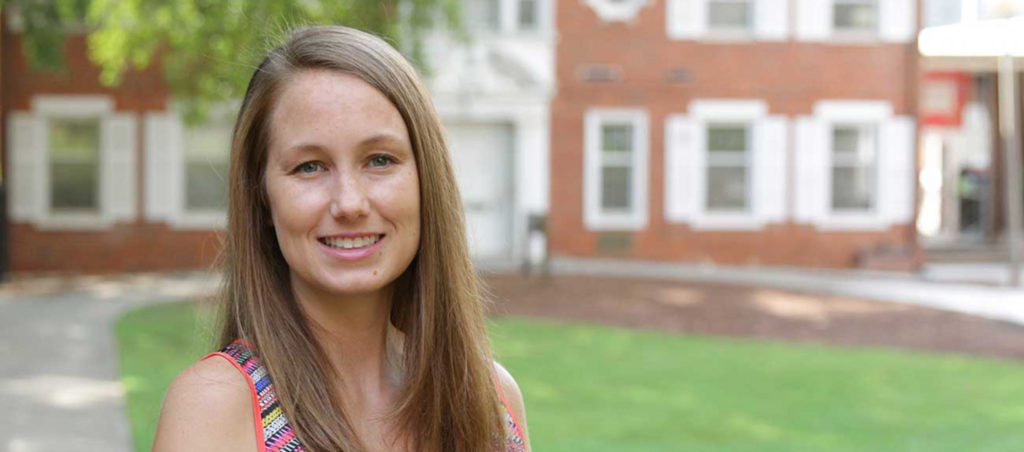Quality relationships help make life what it is

Owens Institute for Behavioral Research Fellow, Catherine O’Neal spends her time studying how people—especially couples and families—relate to each other and how they can do it better. She began training as a marriage and family therapist but fell in love with the research while earning her Ph.D. from UGA’s Department of Human Development and Family Science.
“I want to understand how people connect and engage with each other,” said O’Neal, now an associate research scientist in that department within the College of Family and Consumer Sciences. “A lot of my research comes from my own questions about why relationships matter and my desire to facilitate healthy relationships as a way to improve individuals’ well-being.”
The stability of strain
Looking at how relationships endure over time is a strong focus of O’Neal’s work. One recent study displayed the stability of marital conflict over long periods. Using a sample of 250 Midwestern couples in lasting heterosexual marriages (some for 40 years or more), she found that those who had high levels of conflict early in midlife were also at risk for high levels of conflict 15 years later, when they were older adults.
“In general, conflict was consistent over time,” she said. “The other thing this study demonstrated was that, at least in this sample of couples, even relationships with high amounts of conflict can be stable. That is, not everyone who experiences marital conflict gets a divorce.”
Currently O’Neal is looking at the consequences of social relationships, like mental and physical health, to see what happens over time and how these aspects relate to each other: How do shifts in physical health relate to the quality of mental health, and how does an improvement in social relationships correlate with physical health?
One type of strain that particularly interests her is financial stress. How do couples experience financial strain, and what implications does it have for other areas of their lives, including interactions with loved ones and physical and mental health? Is the stress relieved when finances improve or do its detrimental effects stick around?
“Our hypothesis,” O’Neal said, “is that financial stress often initiates what we refer to as a ‘chain of insults,’ where it triggers life events, such as changing jobs, and other stresses like depression, poor physical health and conflictual interactions. Moreover, we are examining whether financial stress amplifies the impact of such life events.
“Decades later, we’re seeing that the effects of financial stress tend to stay with you, even when the finances are no longer shaky.”
O’Neal is leveraging her work on financial stress to help look for intervention and prevention solutions. For instance, she is working with the U.S. Air Force to measure the effectiveness of financial training modules to help personnel manage their finances and well-being at important life “touchpoints,” such as the birth of a child, relocation or retirement. Aiming to provide “just in time” financial knowledge may lead to better financial decisions and, ultimately, well-being, she said.
Working with colleagues in engineering, journalism and mass communications, and sociology, Catie O’Neal is testing a new way to keep military families connected when a member is on deployment. This virtual reality environment allows family members to interact in settings more typical of home life, such as backyards, living rooms and basketball courts. “The idea,” she said, “is that military family members not only get to talk to each other, but the family room allows them to engage in activities together—much like they do at home.” (Image courtesy of UGA Virtual Experiences Laboratory, College of Engineering)
Little things mean a lot
In another example of how risk can result in resilience, O’Neal is working to help military families stay connected when they are geographically separated. In collaboration with OIBR Fellow Sun Joo “Grace” Ahn in the Grady College of Journalism and Mass Communication, Kyle Johnsen in the College of Engineering, and OIBR Fellow Dawn Robinson in the Franklin College of Arts and Sciences, she and the team use virtual reality headsets to help families engage in activities that are not usually possible when a family member goes on deployment.
“We have a virtual family room where there is a basketball hoop, checkers and a backyard where you can throw the ball back and forth,” O’Neal explained. “The idea is that military family members not only get to talk to each other, but the family room allows them to engage in activities together—much like they do at home.”
As the COVID-19 pandemic has shown, these fleeting moments of connection in family life can take on much greater importance when they’re suddenly gone.
“You know, before COVID, my research coordinator and I would go to lunch, where we would talk about work but also talk about so many other little things that come up in conversation,” O’Neal said. “I miss those small connecting moments, and I believe that we as a society are missing out on these small but meaningful social connections during the pandemic.”
In particular, the extreme amount of stress that nurses and other medical professionals are going through during the pandemic occupies her mind a lot these days.
“What are the long-term consequences,” she asked, “of being under this severe strain for an extended number of hours every day and then having to come home and shift roles from caring for patients to taking care of a family, without having any significant amount of time to process the events you’ve just experienced at the hospital?”
She also wonders about the emotional toll on families who have lost a loved one to COVID.
“Research with military families has examined ambiguous loss, where loss occurs without closure or clear understanding. Families who have experienced the death of a loved one during COVID have often received no or limited information on what happened and have had little time to say goodbye. It’s possible these scenarios may also create ambiguous loss and even experiences of post-traumatic stress,” she said.
One part of her work she especially enjoys is interpreting others’ research to make it accessible and meaningful to broader audiences. Drafting reports for the Department of Defense on topics relevant to the military and policymaking means she must write for a vastly different audience than the peers who read her research papers. While one style calls for nearly every potentiality to be covered, the other demands efficiency of words and time. Writing for both audiences has made her better at communicating her own research.
“As a social scientist whose work started in marriage and family therapy, the thing that I believe most strongly is that relationships matter,” she said. “The quality of the different types of relationships—including parent-child, between spouses, members of extended families, colleagues—they all help make life what it is.”
This article was written by David Terraso for the UGA Office of Research.
